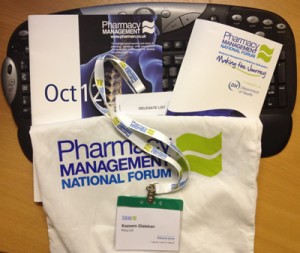by Kazeem Olalekan MRPharmS
I was at the Pharmacy Management National Forum held on Thursday 15 November 2013 at Novotel in Hammersmith. This is the second instalment of my conference notes. In my first instalment, I eluded to what we are doing in Wessex around transfer of care. I will be using this post to explore what Medicines Optimisation really is. But before I do that, however, I will like to discuss one or two things that is imperative about the person who will deliver that Medicines Optimisation for our patient:- Clearly the person has to be a pharmacist working in a primary, secondary or tertiary care setting.
- To be able to do justice to this service, that person must believe that s/he can really make a difference. In effect that person should be an Medicines Evangelist. In our parlance, we call that an MUR Evangelist.
- As a good starting point, I like the acronym used by Dr Mark Tomlin, in our case study interview, to describe what an Hospital Clinical Pharmacist does. If you strip that down, I honestly believe that the acronym works for any area of pharmacy practice. Different areas of practice will emphasise different areas of the acronym. The acronym is very S P E C I F I C and represents a good starting point.
S – supply chain understanding and intelligence
P – posology/product knowledge
E – in-depth understanding of errors: why they occur and how to prevent them
C – expertise in calculation and pharmacokinetics
I – medication interaction management
F – in-depth understanding of formulation of drugs
I – management of IV incompatibilities
C – pharmacology & therapeutics
What are the drivers that makes one want to make a difference in a sustainable way?
Passion for the subject is clearly important and the right mix of passion is imperative. We used a dualistic model of passion in final year and pre-registration pharmacists to describe professional engagement (and this). Without passion, I observed, we risk feeling nothing as our legs are sheared off – just like the apocryphal tale of Lord Uxbridge’s leg in the battle of Waterloo.
It is with a lot of anticipation for this Pharmacy Management Forum, that I started tweeting on the train on my way to Waterloo station from Southampton. I was not disappointed. It wasn’t just me. Check out the video below which details what those who attended thought.
One of the key presentation that grasped my attention with respect to drivers for wanting to make a difference, is the burning platform metaphor used by Clare Howard in her presentation.
Better probable death than certain death.
In the land of burning platforms, there are far too many pyromaniacs.
Keywords are: Balance, Burning Ambition, Fulfilling Leadership potential, Desire to live a big and authentic life
We got over the personal stuff: What do I understand by Medicines Optimisation?
Medicine Optimisation can transform lives.
It is a duty of quality.
It is about outcome, value and quality
– Keith Ridge
This may sound nebulous at first glance but it is a lot more profound. If I were to explore this in more details from the interview given by Dr Keith Ridge to the Journal recently, the magnitude of the concept will start to filter through. The concept, according to Dr Ridge, is about improving quality, outcome and value for patients from their use of medicines. It is about higher level of engagement with patients and the public as well as breaking down barrier between professions.
Examples:
- If a patient were to present in the pharmacy with specific problems with their medication…what are we going to do? Are we going to just send them away to their GP or are we going to own it and make representation on their behalf to the relevant health professional? There are tools like MUR and NMS we can now use to make this happen.
- Is this just about medication? Or are we going to take a more holistic look at the patient to understand drivers relevant to the specific medication issue? I interview a colleague of my Patricia Lee, recently. She said something to me in the course of the interview that rang so true. Listen below:
When the Panel was asked if Medicines Management failed the NHS, It was argued that we need to build on the strength of medicines management and move to a position where we focus on outcomes and engage with patients. I quoted Richard Seal as saying:
Medicines Optimisation is far more patient centred.
– Richard Seal
Medicines Optimisation is not just about cost. It is about multidisciplinary working for patient’s benefit.
Dr Ridge said that Medicines Optimisation cuts across all therapeutic areas and will be working with NICE to produce a guideline. We will hold Dr Ridge up to that promise.
When the question was posed whether Medicine Optimisation is airy-fairy? I will let you be the judge of that. I don’t think it is. I have reached that conclusion from facts on the ground. This is not hocus pocus. It works and I think you should try it.







Leave a Reply